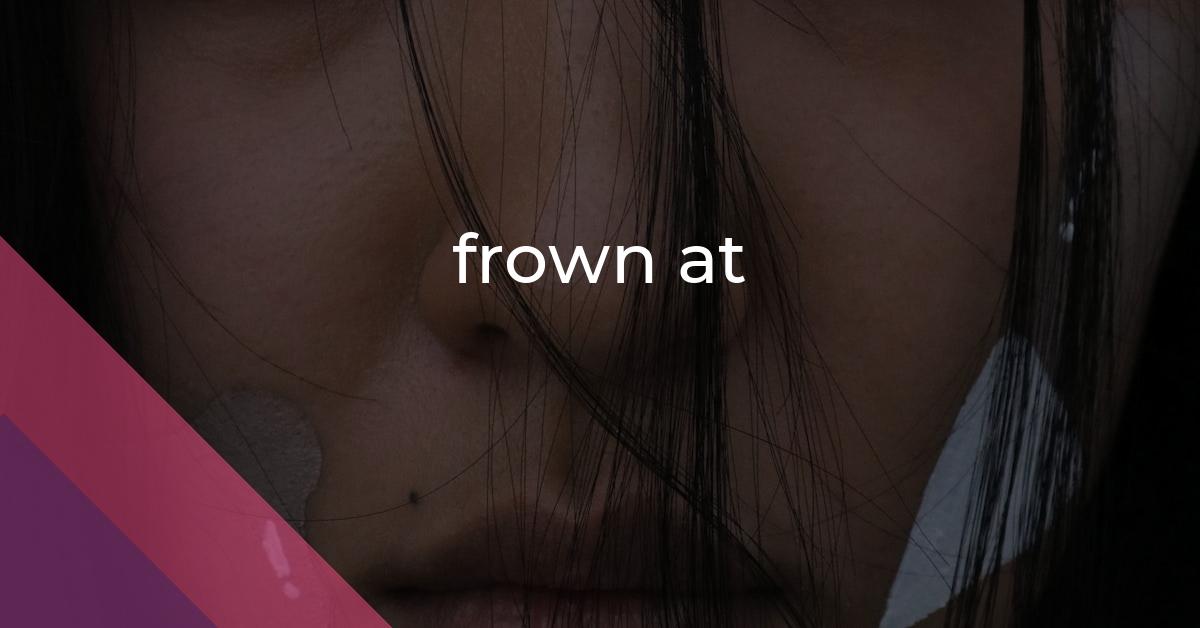frown at: Idiom Meaning and Origin
What does ‘frown at’ mean?
The idiom "frown at" means to display disapproval or express dislike towards someone or something through a facial expression of wrinkling or lowering one's brow.

Idiom Explorer
Analyzing the idiom "knit one's eyebrows", it refers to the act of furrowing or contracting one's eyebrows together, usually done to show confusion, worry, or deep concentration.
The idiom *in your face* means to confront someone with something aggressively or boldly, often to provoke a reaction. It implies direct and unapologetic behavior, disregarding social boundaries.
The idiom "in someone's face" means to confront or challenge someone in a direct and aggressive manner, often done to assert dominance or to express anger or frustration.
The idiom "in the face of" means to confront or deal with something difficult or challenging. It implies facing a problem or obstacle directly and not being intimidated or deterred by it.
An idiom meaning someone has an extremely unattractive or unpleasant face, often used to give a brutally honest description of someone's appearance.
The idiom "hard on the eyes" is used to describe something that is visually unappealing or difficult to look at.
The idiom "give someone the brush-off" means to dismiss or reject someone in an abrupt or unceremonious manner, usually through indifference or rudeness.
The idiom "give someone grief" means to continuously cause trouble or annoyance to someone, often by criticizing or complaining about their actions or behavior.
The idiom *fuck you* is an offensive, vulgar expression typically used to convey extreme anger, resentment, or contempt towards someone. It is highly inappropriate in most formal or polite settings.
Disapproving Facial Expression
Frown at is an idiom that is commonly used in English language. It is used to describe a facial expression characterized by the action of furrowing one's eyebrows and tightening the muscles of the face in a disapproving or displeased manner towards someone or something. The idiom can be traced back to the Old English word "frēon" which means "to frown". When combined with the preposition "at", it conveys the act of expressing disapproval or dissatisfaction through facial expressions.
The usage of the idiom "frown at" is commonly seen in various contexts. It can be used to describe a person's reaction or response to a particular situation, behavior, or action that they find displeasing or unacceptable. For example, someone might frown at a rude comment or a controversial statement made by another person.
When frowning at someone or something, it is often accompanied by a change in facial expression that conveys a sense of disapproval, displeasure, or disfavor. This change in facial expression may involve furrowing the eyebrows, lowering the corners of the mouth, and/or tightening the muscles in the face.
The idiom can also be used figuratively to describe a negative judgment or criticism towards something. For instance, one might frown at a proposal or an idea that they disagree with or find unfavorable.
Furthermore, the idiom "frown at" is not limited to verbal communication. It can also be used to describe non-verbal cues such as body language or gestures that indicate disapproval or displeasure. In such cases, the frown itself may not be physically present, but the disapproving attitude is conveyed through other means.
Another idiom that relates to the concept of frowning is "knit one's brows". This idiom is often used interchangeably with "frown at" to describe the action of furrowing one's eyebrows in a similar manner to show disapproval or concern. It emphasizes the physical act of knitting or tightening the eyebrows together, creating a similar expression to a frown.
In addition, another related idiom is "have a face like the back end of a bus". This idiom describes a facial expression that is extremely displeased, unattractive, or unkind. It suggests a level of disapproval or dissatisfaction that is more severe than a simple frown or knitted brows. Someone with a face like the back end of a bus would have a deeply furrowed brow, downturned mouth, and an overall expression of extreme displeasure.
The idiom "frown at" is a commonly used verb phrase in the English language. It originated from the Old English word "frēon" and the preposition "at". The idiom is used to describe a facial expression and accompanying attitude of disapproval or displeasure towards someone or something. It can be used both literally and figuratively, encompassing verbal and non-verbal forms of communication. The idiom "frown at" is a powerful linguistic tool that allows individuals to express their negative judgment or criticism in a concise and impactful manner.
Example usage
Examples of how the idiom "frown at" can be used in a sentence are:
- I could see my teacher frown at me when I arrived late to class.
- She always frowns at anyone who chews gum in front of her.
- He frowned at the idea of going to the party after a long day at work.
More "Expression" idioms



